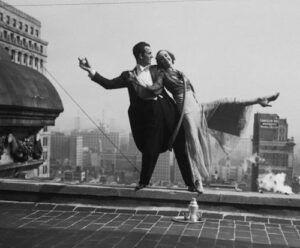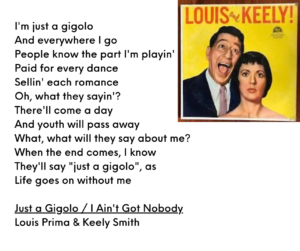Ken thinks I’m an idiot because I didn’t buy a business.
Building my first small business was a life defining, 15-year journey. But after hearing my story, a condescending grin spreads across Ken’s face as he asks . . .
Why would you waste so much time building a business?
Buy a business my way and strike it rich!
Ken is a real person. I’ve changed the details, so you won’t recognize him, but he is out there, and if you listen closely you can hear him sing . . .
I’m just a gigolo
And everywhere I go
People know the part I’m playin
A Gigolo Is . . .
It’s someone who dances, or does other things, for the money.
As dance halls and popular dancing, especially the tango, became the rage in France in the early twentieth century, dance halls hired professional dancing partners . . . who could perform the tango. encyclopedia.com
In other words . . .
Paid for every dance
Sellin’ each romance
Sexual connotation aside, a gigolo goes be-bopping through the dancehall, twirling partner after partner, trying to pocket maximum cash from each one. When it comes to business ownership – that’s Ken.
He’s a business gigolo.
When Ken decides to buy a business, it’s a short-term deal. Ken “owns the business” but he’s not in any organic way a business owner. For Ken, the business is simply a commodity.
Think of him as a less telegenic, two-bit version of a Teldar Paper buying Gordon Gecko.
Like Gecko, Ken looks for any crack he can crawl through to buy a business on the cheap. And once in, as quickly as possible, he finds a way to get back out. In fact, he discourages holding even a profitable business for too long. He likes to say . . .
Get in. Get out. Get paid.
Yuck
Ken’s slimy. Oozy. Smarmy.
He’s the kind of guy that makes you want to wash your hands after you have lunch together, even if you never shook hands. That’s how Ken makes me feel – and how I believe he makes most people feel. There is no attracting authenticity to Ken. He’s always . . .
Get in. Get out. Get paid.
That’s his gigolo tune. Which I guess is OK, because it makes him easy to pick out in a crowd.
We all know what he and his fellow gigolo’s sound like . . . or do we?
 How Did You Learn to Dance?
How Did You Learn to Dance?
I recently listened to a podcast where two energetic, vibrant, young entrepreneurs were talking about how to buy a business.
Unlike Ken, these two were likable and certainly seemed authentic. No discernable ooziness.
They’ve bought and sold several businesses (websites) over their relatively short careers. And as they talked, they schooled listeners on how they do what they do.
I buy it knowing I can 2X the value by applying my SEO skills. Then, I sell it 18 months later.
And then . . .
It’s great to find an older site where you can introduce a Facebook Ad options.
I was fascinated.
I just love this stuff.
Out of Tune
But as I listened, enjoying myself, my rhythm was interrupted by something I thought I heard in the background. I was recognizing a tune . . .
Buy the website.
Jack up the view count.
Sell the website.
Wait a minute. That sounds a lot like . . .
Get in. Get out. Get paid.
But that doesn’t make sense does it? These two are so likeable.
Are they just gigolos in better outfits?
Are they simply singing Ken’s tune in a more attractive key?
I should be able to recognize a business gigolo, shouldn’t I?
After all, I was one for a short time.

My Gigolo Dance
I decided to buy a business several years ago with the sole purpose of turning it around to sell it.
Everything about that venture was fast, and I’m not going to lie to you, it was fun. Fast, fun . . . and lucrative. We saw a 3X business value increase in a few short years.
Search. Find. Buy. Sell. (repeat?)
And I could have kept doing that dance, except after I closed the deal, I realized something was “off” about the experience.
It took me a while to zero in on what it was.
I bought the business to get in, get out, and get paid, and I made all my decisions with that outcome in mind. That meant I was making choices with a very short-term consequence timeline, and the truth is it made it easy to take short-cuts.
In fact, given the goal, taking short-cuts was often the right decision. But that “short timer” approach, also came with some very unpleasant, unintended consequences.
For example, I found I tolerated behavior in employees (even accommodated it) that I never would have before. One situation comes to mind that deeply troubles me in retrospect. I’ll save the details of the story for a future, more self-deprecating post. But the short version is that it involved law enforcement, an employee who did something undeniably worthy of termination, and my milk-toast waffling.
Yep, I found a way to stomach his unsavory behavior because I knew I was a short-timer, and the employee served a valuable, short-term role for the business.
As a business gigolo, it was so easy to dance past the long-term consequences. I had forgotten that . . .
There’ll come a day
And youth will pass away
What, what will they say about me?

My Non-Gigolo Dance
My wife and I started our first business in the mid-1990’s. We grew that business over 15 years, to 50 full-time employees, and sold it in 2010. Even though we ended up selling, the truth of that journey was that we thought we were going to own the business forever.
And that’s the way we ran it.
I was recently gifted with a note from a former employee that spoke to our “own it forever” management approach.
She wrote:
I remember being so, SO incredibly nervous when I approached Mike for a raise. He knew what I wanted to ask him, so he took me out to lunch, and had me give him my “pitch” for why I deserved one.
I pretty much felt like I was going to throw up the entire time, and I barely ate any of my lunch. As a young person, I hated every minute of it, and was totally intimidated, but he was incredibly kind about the whole thing.
He knew what I wanted, but he also wasn’t going to give it to me without the work, and the nerves, and the nausea.
That was an incredibly wonderful learning experience for me. At the time I hated it, but I am so glad he made me go through it because I realized then that we have to be our own advocates.
We have to put on our big girl pants, and even if it’s scary, we have to communicate.
Why We Dance
I don’t remember the lunch she writes about, but the story doesn’t surprise me. I tried to take full advantage of this kind of employee development opportunity. I’d turn what could be a 5 minute conversation into a two hour exercise if I thought it would help the employee grow.
Self praise? Nope. Simply a reflection of what I saw as a good investment at the time.
When I ran that business, I was 100% committed to her getting better at her job.
Why?

I thought she was going to be working with us for years (she did).
Just like my other employees, my long-term interests, and her interests, were aligned. The better she got, the better it was for my clients and for me. So, I invested in her.
I also invested in the community where the business was located. We we’re going to be there for awhile and I wanted to benefit from the community getting better.
I didn’t do these things because I’m a great guy, I made these investments because they served my self-interest. Our time in that community, with those employees, was not going to be a short dance.
And it’s interesting, I’ve received other notes from employees at that first business, but never one from my employees at my short-term gigolo company.
Why?
Because the dances are different.
 The Price of the Quick Dance
The Price of the Quick Dance
I used to find Ken’s “buy a business then sell it” storytelling content interesting, but not anymore. I’ve come to realize that there’s a line – a critical, soul and community impacting line that we have to be careful not to cross.
I wonder if that line is getting blurrier these days?
It’s always been possible to bump into a gigolo in business. There’s a subset of business “owners” that are purely opportunistic and transactional, and they usually give most of us the creeps.
In the past we would brush them aside, and simply refuse to return their calls – but now they have followers, podcasts, YouTube channels, and training programs where they train aspiring business owners to “not be foolish.”
Ken calls long-term, committed small business owners “foolish”.
Foolish.
Oh boy. We’re in real trouble if we forget how badly we need “foolish” small business owners.
Those are the owners that . . .
- Donate to the local high school band, and science club, and choir, and . . . year after year after year.
- Make investments in employees that won’t pay off for a decade, because they’re hoping the employee will be around in a decade.
- Serve on chambers of commerce and nonprofit boards as they work to change the community for the better.
Ken Doesn’t Do Those Things
Ken’s never around long enough to care about those things. He’s too “smart” for that.
I also wonder if the podcast entrepreneurs do those things. Their businesses have virtual homes. Their employees (or contractors more likely) often share no community. They are in it for the short-term, and it’s hard for an owner to think about those long-term investments if they plan to sell the business in 18 months.
Fellow dancers, we need to be careful.
If a business becomes something we just own, a simple commodity that we’re into for the quick money, our alignment with our customers, employees and communities becomes tenuous at best.
 We need more “foolish” business owners.
We need more “foolish” business owners.
At the very least, we can’t applaud Ken’s dance, no matter how well he does it. Because make no mistake, Ken is leaving when the music stops.
He will abandon us.
It’s his plan.
It’s what gigolos do.
More Authentic Owners Please
If you bump into Ken on the internet, or on the dance floor, don’t be enticed.
He’s an impostor. He doesn’t bring any passion to the journey, and that’s what makes a small business dance worth watching.
It’s time for a moratorium on gigolos.
We need authentic, small business owners who are building long-term, shared, community engaging, investment making, value creating, profitable companies.
Many, many, many more.
Without them. . .well . . .let’s just end on the chorus . . .
There’s nobody that cares for me